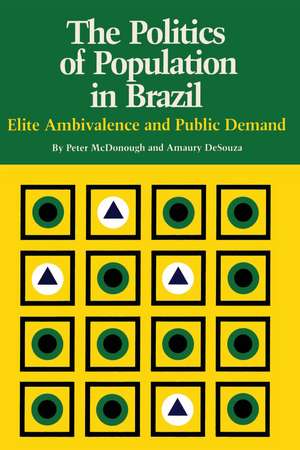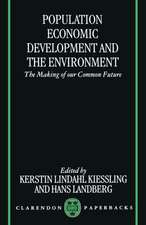The Politics of Population in Brazil: Elite Ambivalence and Public Demand: Texas Pan American Series
Autor Peter McDonough, Amaury DeSouzaen Limba Engleză Paperback – feb 1981
A major reason for this disparity is that the elites tend to define the issue as a matter of national power and collective growth, and the public sees it as a bread-and-butter question affecting the daily lives of families. McDonough and DeSouza document not only the real gulf between elite and mass opinion but also the propensity of the elites to exaggerate this gap through their stereotyping of public opinion as conservative and disinterested in family planning.
Despite these differences, the authors demonstrate that population planning is less conflict ridden than many other controversies in Brazilian politics and probably more amenable to piecemeal bargaining than some earlier studies suggest. In part, this is because attitudes on the issue are not closely identified with opinions regarding left-versus-right disputes. In addition, for the public in general, religious sentiment affects attitudes toward family planning only indirectly. This separation, which reflects the historical lack of penetration of Brazilian society on the part of the church, further attenuates the issue's potential for galvanizing deep-seated antagonisms. As the authors note, this situation stands in contrast to the fierce debates that moral issues have generated in Spain and Ireland.
The study is noteworthy not only for its original approach—the incorporation of mass and elite data and the departure from the standard concerns with fertility determinants in population—but also for its sophisticated methodology and lucid presentation.
Din seria Texas Pan American Series
-
 Preț: 144.84 lei
Preț: 144.84 lei -
 Preț: 168.87 lei
Preț: 168.87 lei -
 Preț: 92.17 lei
Preț: 92.17 lei -
 Preț: 125.18 lei
Preț: 125.18 lei -
 Preț: 144.22 lei
Preț: 144.22 lei -
 Preț: 144.11 lei
Preț: 144.11 lei -
 Preț: 111.26 lei
Preț: 111.26 lei -
 Preț: 283.62 lei
Preț: 283.62 lei -
 Preț: 136.75 lei
Preț: 136.75 lei -
 Preț: 341.43 lei
Preț: 341.43 lei -
 Preț: 166.47 lei
Preț: 166.47 lei -
 Preț: 203.73 lei
Preț: 203.73 lei -
 Preț: 203.73 lei
Preț: 203.73 lei -
 Preț: 232.88 lei
Preț: 232.88 lei -
 Preț: 228.04 lei
Preț: 228.04 lei -
 Preț: 166.47 lei
Preț: 166.47 lei -
 Preț: 282.10 lei
Preț: 282.10 lei -
 Preț: 240.63 lei
Preț: 240.63 lei -
 Preț: 240.63 lei
Preț: 240.63 lei -
 Preț: 203.73 lei
Preț: 203.73 lei -
 Preț: 203.73 lei
Preț: 203.73 lei -
 Preț: 174.09 lei
Preț: 174.09 lei -
 Preț: 314.03 lei
Preț: 314.03 lei -
 Preț: 203.73 lei
Preț: 203.73 lei -
 Preț: 197.97 lei
Preț: 197.97 lei -
 Preț: 166.47 lei
Preț: 166.47 lei -
 Preț: 157.01 lei
Preț: 157.01 lei -
 Preț: 155.68 lei
Preț: 155.68 lei -
 Preț: 240.26 lei
Preț: 240.26 lei -
 Preț: 155.10 lei
Preț: 155.10 lei -
 Preț: 277.53 lei
Preț: 277.53 lei -
 Preț: 203.73 lei
Preț: 203.73 lei -
 Preț: 295.94 lei
Preț: 295.94 lei -
 Preț: 166.47 lei
Preț: 166.47 lei -
 Preț: 277.16 lei
Preț: 277.16 lei -
 Preț: 262.40 lei
Preț: 262.40 lei -
 Preț: 159.09 lei
Preț: 159.09 lei -
 Preț: 183.98 lei
Preț: 183.98 lei -
 Preț: 277.16 lei
Preț: 277.16 lei -
 Preț: 240.26 lei
Preț: 240.26 lei -
 Preț: 166.47 lei
Preț: 166.47 lei -
 Preț: 157.98 lei
Preț: 157.98 lei -
 Preț: 262.40 lei
Preț: 262.40 lei -
 Preț: 203.73 lei
Preț: 203.73 lei -
 Preț: 166.47 lei
Preț: 166.47 lei -
 Preț: 319.98 lei
Preț: 319.98 lei -
 Preț: 239.09 lei
Preț: 239.09 lei -
 Preț: 262.40 lei
Preț: 262.40 lei -
 Preț: 203.73 lei
Preț: 203.73 lei -
 Preț: 263.54 lei
Preț: 263.54 lei
Preț: 166.47 lei
Nou
Puncte Express: 250
Preț estimativ în valută:
31.85€ • 33.33$ • 26.46£
31.85€ • 33.33$ • 26.46£
Carte tipărită la comandă
Livrare economică 02-16 aprilie
Preluare comenzi: 021 569.72.76
Specificații
ISBN-13: 9780292741409
ISBN-10: 0292741405
Pagini: 190
Dimensiuni: 152 x 229 x 15 mm
Greutate: 0.45 kg
Editura: University of Texas Press
Colecția University of Texas Press
Seria Texas Pan American Series
ISBN-10: 0292741405
Pagini: 190
Dimensiuni: 152 x 229 x 15 mm
Greutate: 0.45 kg
Editura: University of Texas Press
Colecția University of Texas Press
Seria Texas Pan American Series
Notă biografică
Peter McDonough is Emeritus Professor of Political Science at Arizona State University.Amaury DeSouza received his Ph.D. in political science from Massachusetts Institute of Technology. He is a senior partner at MCM Consultores Associados.
Cuprins
- Acknowledgments
- 1. Overview
- The Political Context of Population Policy in Brazil
- Principal Themes
- The Nature of the Evidence
- Organization of the Analysis
- 2. Elite Opinion
- Recognition of and Priorities on Population Problems
- Preferences on Birth Control
- Mechanisms of Population Policy
- Conclusion
- 3. Public Opinion
- Some Basic Concepts
- The Salience of the Family Planning Issue
- Contours of Opinion
- The Determinants of Preferences on Family Planning and Divorce
- Protoconstituencies for Family Planning
- Conclusion
- 4. Elite Perceptions
- Interlite Perceptions
- Elite Perceptions of Public Opinion
- Conclusion
- 5. Summing Up
- Appendices
- I. The Elite Sample
- II. The Sample of Southeast Brazil
- Notes
- Bibliography
- Index
Descriere
This book examines the attitudes toward population planning of Brazilian government officials and other elites—bishops, politicians, labor leaders, and business owners—in comparison with mass public opinion.
















